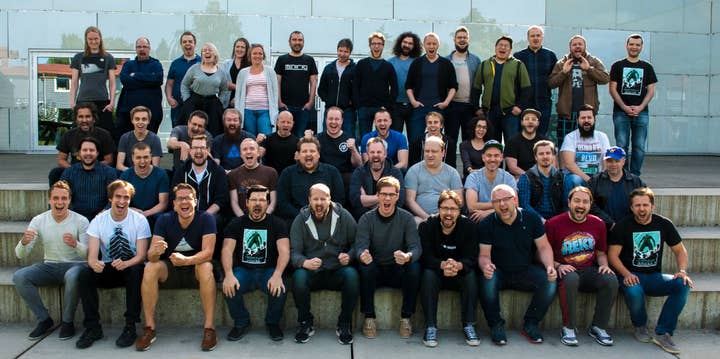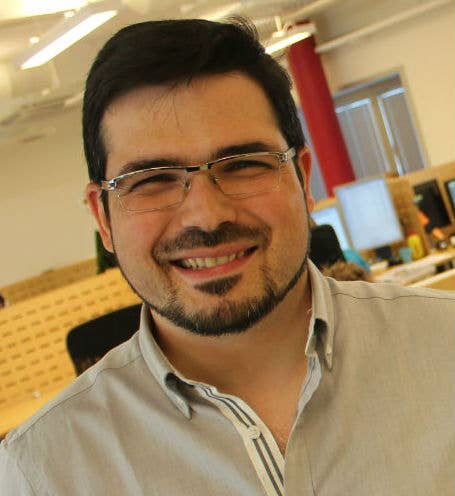Funcom: "You can't survive for 20 years without a few scars"
With a new logo, new website and new product strategy, Funcom CEO Rui Casais is facing the future with confidence
When I last visited Funcom the industry was a very different place, and Funcom was a very different company.
It was 2011, and the Norwegian developer had opened an office in Montreal around 18 months before. It already had two MMOs on the market, Age of Conan and Anarchy Online, and it was readying to launch another in The Secret World. Age of Conan and The Secret World, in particular, were huge projects that required five or more years to develop, with budgets in the tens of millions of dollars, and team sizes in the hundreds.
At its peak in 2008, Funcom had around 680 employees spread across offices all over the world. Speaking exclusively to GamesIndustry.biz, Funcom's vice president of PR and marketing, Erling Ellingsen, describes the company in those days as a "behemoth," but much has changed since then - both in terms of the industry, and for Funcom itself.
"Big bets can pay off very well, but they can also not work at all and sink the ship"
Now, with Conan: Exiles and a rebooted version of The Secret World both on the market, it is ready to pull the trigger on a plan to rebrand the company, marking the start of a new chapter in its 24-year history.
"Players have seen the same logo for the last decade, and that logo has represented many different things. It's time we had a look and a brand that shows the new Funcom," says Rui Casais, who joined the company as a junior AI programmer in 2004, and was named its new CEO during a turbulent 2015.
"Now we are smaller, we're leaner, and we're more focused on getting games out there that are solid, well received and have something different... We're putting more games out there, instead of having these gigantic bets we had in the past. They were big bets, and big bets can pay off very well, but they can also not work at all and sink the ship.
"The ship didn't sink, but we were bailing water a lot."

One need only search for Funcom in the GamesIndustry.biz archive to understand what Casais means by "bailing water," but it's probably enough to note that, from that 680 employee peak, the company now has a headcount of around 120 people. Indeed, the difficulty of that journey is essential to the message that Casais and his team wants to send; Funcom has a long history, spanning Sega Mega Drive pixel platformers, adventure games, MMOs and more. As Casais points out, "In gaming, you can't survive for 20 years without a few scars," and Funcom is now moving forward with both the triumphs and the failures of the past firmly in mind.
"It is very important for me, and very important for us, to humbly accept that, yes, we have lost many battles," says Casais. "We won quite a few as well, but we need to recognise our mistakes, our weaknesses.

"I'm an engineer. I've been here for 13 years now, and personally I've seen a lot of drive and a lot of passion, but also mistakes that kept on getting repeated. At some point you need to say enough is enough, we know we're making mistakes, so let's fix them. This change we've been doing for the last couple of years is part of it, and this new look is intended to reflect that."
Perhaps the most important aspect of the change will be the transition to smaller projects; games with two-year development cycles rather than five or six, so that Funcom's two studios (Oslo, Norway and Durham, North Carolina) are releasing content into the market on a more regular basis. According to Casais, achieving this while maintaining a consistently high level of quality has required a fundamental reappraisal of the company's processes and studio culture.

"Funcom games have always been rough diamonds," he says. "Fantastic potential, great ideas, innovative gameplay and systems, but they weren't always polished to the utmost shine. That takes time to change."
The process is ongoing, and Casais makes no attempt to convince me that Funcom has already achieved its goal. He mentions technical issues that players of the Xbox version of Conan Exiles experienced on several occasions, each time with a note of sincere frustration in his voice. "It is something that we're taking very seriously, that we want to address," he says. "We want to have more games being made and to keep pushing innovation, but quality cannot be sacrificed."
When it comes to the new look Funcom, Conan Exiles is almost certainly the single most important part of its near-term strategy. The survival game launched on Steam Early Access at the start of the year, and hit its annual unit sales target in just 28 days. Funcom will invest as much as $10 million extra in the game before its expected launch in Q1 2018, with Koch Media signed as co-publisher for the physical retail release.
In fact, when I first saw the company's new logo, I was certain that the screaming face enmeshed with the white flag was Conan himself. Casais chuckles, and politely dismisses the notion; the face represents Funcom as a whole rather than Conan specifically, with the idea for the logo set well before Conan Exiles was even released.
"We wanted to have the right timing for [the rebrand], and Conan really helped that of course," he says, but he's also keen to highlight the strong performance of the rebooted version of The Secret World. "It exceeded our internal expectations... We're getting a lot of new people coming in and trying it out. The game feels more alive than it has in many years."
"We want to have more games being made and to keep pushing innovation, but quality cannot be sacrificed"
At present, Funcom Oslo is working on Conan Exiles, while North Carolina shipped The Secret World Legends in July. According to Casais, both studios will start developing new projects "soon," and they could vary in size from a game like Conan Exiles to smaller projects that the company will use to "test" new ideas, new technologies, new team combinations, new genres; any area where knowledge can be built and technique refined.
Funcom proved the concept with The Park, a spin-off from The Secret World that was published in 2015. It was the first time the company had used the Unreal Engine, its first project completed in under six months, its first single-player game for Steam, and its first game for the current generation of consoles. "We tried all of these things with a new project," Casais says. "It sold a good amount, it was profitable, and we took the learning from that and went into Conan Exiles with a lot more confidence."
Funcom's smaller games will be for PC and console only, with budgets of no more than $500,000, while its bigger titles will cost between $5 million and $15 million - "and not ever more than $20 million." The success of Conan Exiles and, now, The Secret World Legends has allowed the company to start growing again, but for Funcom the days of $50 million budgets and 600 person headcounts are very likely over.
"That has hurt us in the past," Casais says. "We will have a core of skilled developers to work on the games, and in bursts we will work with external companies to provide additional art production, additional tech support and things like that.
"Instead of growing very fast because we suddenly have a big project, we will slowly grow the core and work with others for support. That way it's much more manageable. We can experiment on ideas with the core, and we don't have those ups and downs that hurt everyone."
